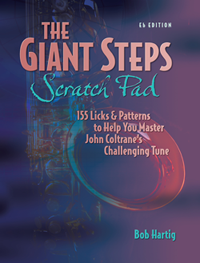If there is one name that is synonymous with the alto saxophone, it’s Charlie Parker. For that matter, no jazz musician of any kind–saxophonist, trumpet player, bassist, pianist, you name it–can explore the craft without becoming keenly aware of, if not at some point deeply immersed in, the music of Bird. If Dizzy Gillespie was the clown prince of the bebop school, Charlie Parker was its pied piper, a quirky and unpredictable genius whose God-given creative torch burned too brightly to be quickly extinguished by the excesses that eventually overcame him.
Some jazz musicians grow up with Parker played regularly at home as a vital part of the musical ambiance. Others discover Parker’s music later in life. I fall into the latter category. Ours was not a particularly musical household, though Mom loved the Nutcracker Suite and Dad dug his Louis Armstrong, Bessie Smith, and Sidney Bechet records. My own musical tastes, once they began to develop, naturally tended toward the rock of the seventies, particularly art rock bands such as Jethro Tull, King Crimson, Yes, Genesis, and Pink Floydd.
I did have the advantage of playing in a big band beginning in the eighth grade. That experience gave me an invaluable exposure to the music of Basie and Ellington, and to the American songbook at large. But bebop? What was that?
Then came my first year at Aquinas College, and a course on modern music appreciation with Dr. Bruce Early. The class covered plenty of ground, as I recall, including the music of some of my favorite rock bands. Inevitably, we got into the various kinds of jazz, which was Bruce’s real thrust with the class. Dixieland I was familiar with, and as for big band swing, I had been playing that since junior high school. But suddenly, jazz began to take on deeper dimensions for me. And one day, Bruce dropped a record onto the turntable, and out of the speakers came the most unbelievable saxophone music I had ever heard. It was blazing. Brilliant. Blinding. Beautiful. Wild, yet–though I wouldn’t have thought of the description at the time–wonderfully logical.
That was my first exposure to Charlie Parker, and it left me stunned. How on earth could anyone play a saxophone like that?
I didn’t have ears enough to comprehend what it was that I had heard. I only knew that it pointed toward possibilities on the alto sax that I had never dreamed of. It was like stepping through a door out of a tiny room and discovering an entire mountain range on the other side.
Fortunately, I was too young and too dumb to feel utterly overwhelmed. That’s probably why I’m still playing the saxophone today. Some contemporaries of Parker weren’t so fortunate. I read of one saxophonist who, after hearing Bird in flight, pitched his horn into the river in despair. Today I understand that sentiment a little better–because, now that I’m more than twice as old as Parker was when he first lit his fire and greased his skillet, I still can’t cook the way he could. I have, however, learned a lot from him, and continue to learn.
If Bird hadn’t been given to the monstrous indulgences that eventually destroyed him, I wonder, as many musicians have wondered, what else he might have accomplished. Would bebop have been his apogee, his singular torch against whose sun-like flame all his future achievements would have paled? Or would it have been the spark to still brighter creative expressions? Dizzy is still with us; had Bird’s life been other than what it was, he might be here, too. But it wasn’t and he’s not, and all we can do is speculate on what might have been or might not have been–and absorb the alto saxophonist’s legacy. In the words of Charles Mingus, “If Charlie Parker was a gunslinger, there’d be a whole lot of dead copycats.”

